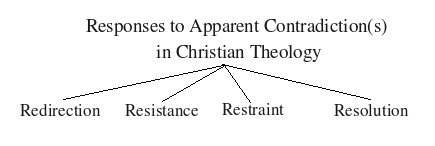Dealing with Apparent Contradictions: Part 13 – Mysterian Resistance
Roll up, folks.
We now move one the fourth R – what I call Mysterian Resistance (or Mysterianism). The Resistor is resisting the pressure to resolve the apparent contradiction, i.e. changing one of the apparently contradictory beliefs. Unlike the Redirector, the Resister doesn’t ignore the apparent inconsistency. And unlike the Resolver, he doesn’t think there’s a reasonable way to make the apparent contradiction go away. So the Resistor resists – he makes his stand – he comes up with a rationale for keeping his apparently contradictory beliefs.Read More »Dealing with Apparent Contradictions: Part 13 – Mysterian Resistance


















